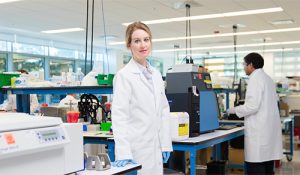
Embattled Theranos CEO Elizabeth Holmes took the stage before 1,000 clinical laboratory scientists in Philadelphia Monday, and if they were expecting a new era of transparency from the 13-year-old diagnostics company regarding its technology and key performance data, they likely came away disappointed.
Instead, during her 45 minutes at the podium at the American Association of Clinical Chemistry (AACC) conference, Holmes detailed the launch of a new product, the miniLab, a customizable tabletop device that can perform a variety of clinical chemistry, hematology, immunohistochemistry, and molecular biology assays using a small sample of blood. Used in conjunction with the Theranos Virtual Analyzer (TVA) software that can operate miniLab remotely, Holmes once again said the company would revolutionize the market by moving away from a centralized model of clinical lab testing.
Couched as the “next phase of the company,” Holmes promised it “will be working with academic institutions and other independent parties to validate and publish our results.” Among these are a capillary blood collection technique she said would soon be submitted for peer review, but also data from the company’s work on the new platform with the Zika virus, which was recently submitted to the FDA for emergency use authorization.
Zika testing, Holmes contended, is a good example of miniLab and TVA’s capabilities “because it’s a beautiful example of a way in which testing can be decentralized and distributed in many of these places where Zika is a world-view problem.”
But while Holmes presentation to AACC attendees was intended to shift focus to Theranos’ new product launch, the elephant in the cavernous grand ballroom remained the unanswered questions about the cascading problems the company has faced the past 2 years regarding its lab operations, the lack of any peer-reviewed data for its original Edison platform, and results from its use of capillary blood instead of standard procedures that rely on blood drawn from veins.
Since the beginning of 2015, the company has been stung by a Wall Street Journal article citing former employees’ contention that only a handful of the tests it marketed used the company’s technology and even fewer used blood derived from capillary collection. At that time, the company promised to publish data it had submitted to the FDA, a promise that is still unfulfilled. In June, amid safety concerns of its diagnostic procedures and results, and as the company and its laboratory in Newark, CA came under investigation by multiple state and federal agencies, Walgreen’s pharmacy announced it was ceasing operation of all 40 of Theranos Wellness Centers.
The most recent blow came last month, when the Centers for Medicare & Medicaid Services (CMS) revoked the Clinical Laboratory Improvement Amendments (CLIA) certification of the company’s Newark lab while also barring Holmes from owning, operating, or directing a laboratory for a minimum of 2 years. This followed a CMS investigation of the lab’s operations that found a number of deficiencies within the operation, including one that posed “immediate jeopardy to patient health and safety.”
Given that context, the product introduction yesterday appears to be a strategy to keep the company operating by moving away from delivering services via its own labs, to one that focuses instead on selling products. And while Holmes clearly avoided any direct mention of the continued controversy surrounding the company, she did admit to some mistakes along the way.
“I wish we had started earlier on building a scientific board and working toward peer-reviewed data,” Holmes noted in the presentation, stating the going forward the company will be “working piece by piece to put out information.”
The company’s intention essentially to start from scratch by presenting a new platform, some internal comparative data of the platform’s capabilities, and a promise for peer-reviewed publication takes it full circle to a position it could have adopted at its founding 13 years ago and one that serves as a tried-and-true model for market entry. Whether the company can finally deliver on its vision of decentralized, inexpensive diagnostics via its new product miniLab remains to be seen, but Holmes promised “we will do and work as hard as it takes to realize this vision.”


